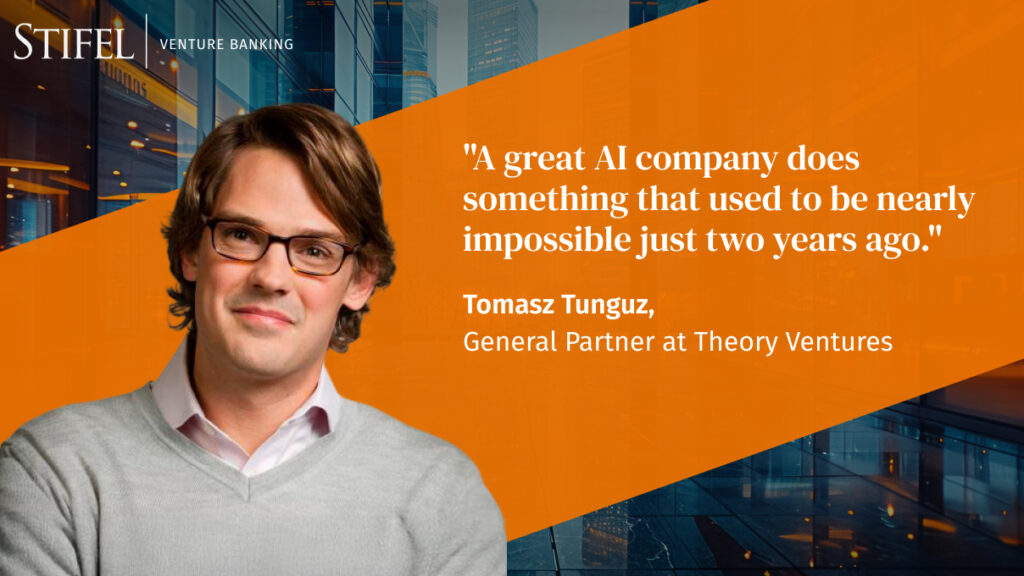A Founder’s Guide to the 2025 AI Landscape: Part Two
Venture Banking

Beyond the initial buzz, the focus shifts to execution. Discover the trends for startups in Part Two of our AI deep dive.
Founders stand at a critical juncture in AI’s evolution. As enterprises grapple with the realities of AI adoption, nimble startups are capitalizing on emerging opportunities—turning AI’s potential into practical, scalable solutions.
Meanwhile, venture capital is shifting from hype-driven funding to investments that prioritize execution, differentiation, and long-term value. As the funding landscape becomes more disciplined, startups are learning to articulate value with more clarity.
Investors and customers alike are rewarding founders who solve a specific, high-value problem, rather than pitching an all-purpose platform. It’s like they say: “No one raises capital on a pipeline that never converts.”
[Read A Founder’s Guide to the 2025 AI Landscape: Part One]
In part two of our AI market analysis, learn more from Tomasz Tunguz, General Partner at Theory Ventures, Howie Xu, Chief AI & Innovation Officer at Gen, and Dr. Lars Friedrich, COO & Head of AI, Stifel Europe AG. We explore how startups can navigate an increasingly competitive landscape, seize AI-driven opportunities, and build sustainable advantage in 2025 and beyond.
- Where Do Startups Hold an Edge in Driving AI Innovation?
- Where Startups Are Seeing AI Funding Success
- The Takeaway: Delivering Impact Will Define 2025
Where Do Startups Hold an Edge in Driving AI Innovation
AI is reshaping industries, but startups, not enterprises, may be best positioned to drive the next wave of innovation. While large enterprises struggle with slow-moving processes and legacy systems, startups thrive on agility, niche focus, and the ability to bet big on emerging trends.
By simplifying deployment and focusing on immediate value, startups can help businesses unlock AI’s benefits without the friction of large-scale transformation. They can build AI-native solutions from the ground up, tailoring their technology for real, unmet needs.
- Agility & speed: Unlike corporate giants navigating bureaucracy, startups can experiment, pivot, and deploy AI faster. This flexibility allows them to take risks on novel AI applications before the industry consensus forms.
- Practicality: While startups can move faster than enterprises, speed without a clear business case is a trap. The best AI startups won’t just build demos—they’ll focus on real-world applications that businesses can adopt today.
- Focused innovation: Rather than retrofitting AI into existing software, startups can build AI-first products designed around its capabilities. They’re driving innovation in areas big companies can’t move fast enough.
- Niche markets & emerging use cases: Enterprises often target mass adoption, leaving gaps in specialized, high-impact applications. Startups are filling these gaps in healthcare AI, logistics, legal tech, and enterprise automation, where AI could fundamentally change how work gets done.
Where Startups Are Seeing AI Funding Success
Investors are looking beyond the hype, focusing on startups that offer real, defensible value in high-impact areas. As Tunguz points out, “A great AI company does something that used to be nearly impossible just two years ago.”

- High-stakes industries: AI-driven innovation in finance, healthcare, and legal tech has massive potential, but regulatory hurdles and accuracy concerns mean adoption will take longer. Xu emphasizes the need for startups that prioritize compliance and reliability.
- Application-layer innovation: Startups that build on top of existing foundation models (like OpenAI or Anthropic) are accelerating time to market by skipping model development and solving specific problems faster.
- AI infrastructure: The next wave of AI startups isn’t just building models. They are focused on the infrastructure, security, and intelligence layers that make AI usable at scale.
- Agentic AI: Xu sees agentic AI—AI that moves beyond simple LLMs and takes real action across complex workflows—as a key area for investment.
Investors are getting sharper about distinguishing fleeting trends from enduring opportunities. The winners will be the startups that don’t just ride the AI wave, but redefine what’s possible.
The Takeaway: Delivering Impact Will Define 2025
The AI landscape is shifting from hype to execution. Founders must focus on real-world impact, not just technical breakthroughs. The most successful AI startups will:
- Solve meaningful business problems. AI for AI’s sake isn’t enough.
- Bridge the enterprise adoption gap and help companies implement AI in ways that drive transformation and differentiation.
- Prioritize usability and compliance, especially in high-stakes industries.
- Leverage AI’s unique strengths, including automation, intelligence, and workflow transformation.
2025 won’t be about AI hype—it’ll be about who can execute, adapt, and lead the next wave of transformation.
In our upcoming founder interview series, we’ll dive deeper into how early-stage companies are navigating this landscape and finding traction in high-impact categories.
Written by
Related Insights
Other articles designed to help you along your financial journey.




